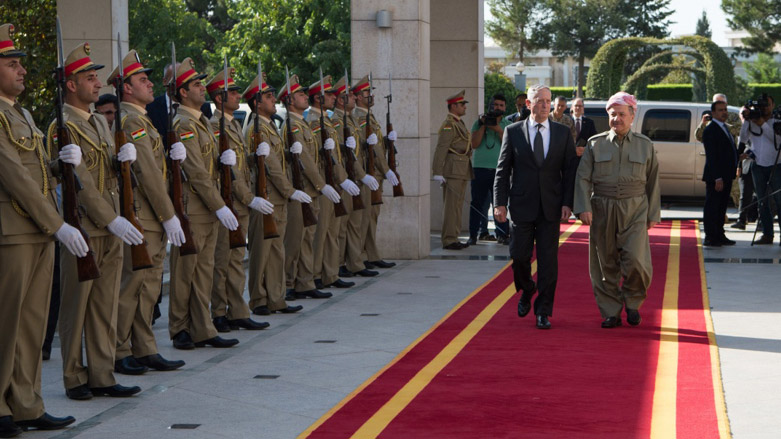Pentagon mum on Mattis’ visit to Erbil, Baghdad, but likely accepts referendum

WASHINGTON DC, United States (Kurdistan 24) – Last week, Jim Mattis paid his first visit to Erbil and Baghdad in his capacity as Secretary of Defense. On Monday, however, in the first regular press briefing since his return, the Pentagon had little to say about the trip.
Mattis arrived last Tuesday in Baghdad, before proceeding to Erbil later that same day. The trip came at a key point in the campaign against the Islamic State (IS.)
With Mosul liberated, IS’ defeat in Iraq is in sight. The US military are great planners, and the Pentagon is looking to what will follow the defeat of the terrorist organization.
America’s continued military presence in the area is a key issue. A general consensus exists in Washington that it was a mistake for the US to have left Iraq in 2012.
In addition, the September 25 independence referendum has made the future of the Kurdistan Region a central question.
There is some significant public record regarding the US position on the referendum. A careful reading suggests that Washington will basically accept it, given the determination of the Kurdistan Regional Government (KRG) to hold the vote.
When Secretary Mattis met KRG President Masoud Barzani last Tuesday, he thanked Barzani “for his strong leadership of Peshmerga forces” and for “being a supportive partner in operations to defeat (IS),” according to the Pentagon’s read-out of their discussion.
Mattis also told Barzani that Mosul’s liberation “was only possible due to the strong cooperation between Baghdad and Erbil.”
Mattis encouraged him “to engage in a sustained dialogue with Prime Minister Abadi and keep the focus on maintaining the momentum against (IS)”—i.e. a gentle way of saying that Mattis asked Barzani to postpone the referendum.
The Kurdistan Region Presidency (KRP) issued a similar account of the meeting, but it mentioned the referendum explicitly.
Barzani informed Mattis of “the old and modern” complaints “the people of Kurdistan have had with Baghdad.” He reassured the US Secretary that “the referendum would not create any problems” for the fight against IS, the KRP read-out explains.
Mattis responded that he understood “the grievances of the people of the Kurdistan Region” and that a step, like the referendum, “is a natural right of any group of people.”
However, Mattis also said that the referendum’s announcement “was not expected” and “the government of the United States is concerned” that it “may cause obstacles for the collective efforts” against IS.
Earlier this month, however, the US spokesman for the anti-IS coalition in Baghdad, Col. Ryan Dillon, told the Pentagon press corps that the upcoming referendum was having no impact in the fight against IS.
The Defense Department has been more understanding of Kurdish aspirations than the State Department, even as the latter has the lead on the issue and remains committed to its long-standing “one-Iraq” policy.
Dr. Josef Olmert, an Israeli-American professor of Middle East Studies at the University of South Carolina, told Kurdistan24 that the position of the State Department—which Mattis articulated—was “completely nonsensical.” Among other things, Olmert noted, IS has been largely defeated in Iraq.
On Wednesday, the day after Mattis was in Erbil, Turkey’s Foreign Minister, Mevlut Cavusoglu, arrived. His position did not differ greatly from Mattis’.
The KRP read-out of Barzani’s meeting with Cavusoglu explained that the Turkish minister acknowledged the referendum as “a natural right of the people of the Kurdistan Region.” However, “the timing may cause more issues in the region,” he said.
While in Erbil, Cavusoglu made a very important statement: Turkey will not close its border should the KRG proceeds with the referendum, he told Kurdish media.
“It is not a good idea,” Cavusoglu said referring to the upcoming vote, but “it has nothing to do with our trade with this Region.”
The US statements—whether issued after Mattis’ meetings in Baghdad or in Erbil—did not explain how the US will maintain its military posture in the area after IS.
Kurdistan24 asked a Pentagon spokesman about that at Monday’s briefing. He replied that no decision had yet been made, and “no matter what happens,” any decision will be based “on a request by the Iraqi government.”
Given Tehran’s strong influence in Baghdad—Olmert called Iraq “a protectorate of Iran”— the US can have no assurance that such a request will be forthcoming.
When Peshmerga Ministry spokesman, Brig. Gen. Halgurd Hikmet, spoke with Kurdistan24 earlier this month, he expressed his doubts that Baghdad would agree to host a US military base, while he affirmed that the KRG would welcome such a base.
Almost certainly, the State Department’s “one-Iraq” policy fails to take into account that key consideration.
Editing by G.H. Renaud

.jpg)